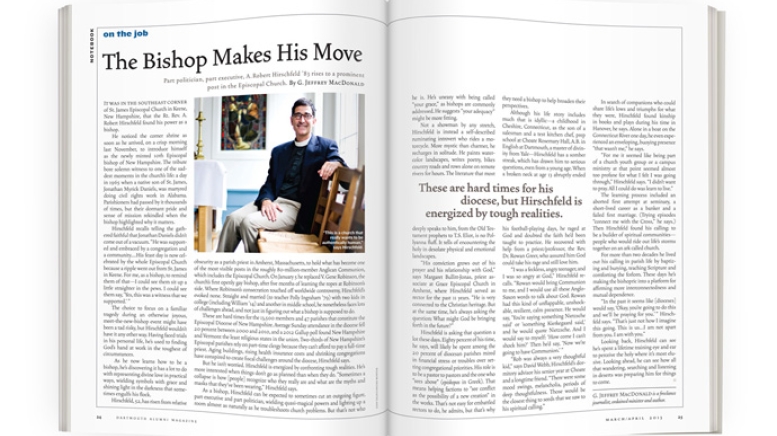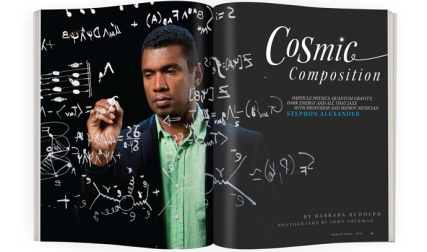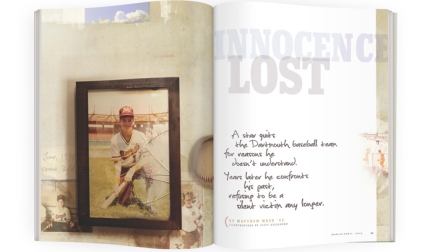It was in the southeast corner of St. James Episcopal Church in Keene, New Hampshire, that the Rt. Rev. A. Robert Hirschfeld found his power as a bishop.
He noticed the corner shrine as soon as he arrived, on a crisp morning last November, to introduce himself as the newly minted 10th Episcopal bishop of New Hampshire. The tribute bore solemn witness to one of the saddest moments in the church’s life: a day in 1965 when a native son of St. James, Jonathan Myrick Daniels, was martyred doing civil rights work in Alabama. Parishioners had passed by it thousands of times, but their dormant pride and sense of mission rekindled when the bishop highlighted why it matters.
Hirschfeld recalls telling the gathered faithful that Jonathan Daniels didn’t come out of a vacuum. “He was supported and embraced by a congregation and a community.…His feast day is now celebrated by the whole Episcopal Church because a ripple went out from St. James in Keene. For me, as a bishop, to remind them of that—I could see them sit up a little straighter in the pews. I could see them say, ‘Yes, this was a witness that we supported.’ ”
The choice to focus on a familiar tragedy during an otherwise joyous, meet-the-new-bishop event might have been a tad risky, but Hirschfeld wouldn’t have it any other way. Having faced trials in his personal life, he’s used to finding God’s hand at work in the toughest of circumstances.
As he now learns how to be a bishop, he’s discovering it has a lot to do with representing divine love in practical ways, wielding symbols with grace and shining light in the darkness that sometimes engulfs his flock.
Hirschfeld, 52, has risen from relative obscurity as a parish priest in Amherst, Massachusetts, to hold what has become one of the most visible posts in the roughly 80-million-member Anglican Communion, which includes the Episcopal Church. On January 5 he replaced V. Gene Robinson, the church’s first openly gay bishop, after five months of learning the ropes at Robinson’s side. Where Robinson’s consecration touched off worldwide controversy, Hirschfeld’s evoked none. Straight and married (to teacher Polly Ingraham ’79) with two kids in college (including William ’14) and another in middle school, he nonetheless faces lots of challenges ahead, and not just in figuring out what a bishop is supposed to do.
These are hard times for the 13,500 members and 47 parishes that constitute the Episcopal Diocese of New Hampshire. Average Sunday attendance in the diocese fell 20 percent between 2000 and 2010, and a 2012 Gallup poll found New Hampshire and Vermont the least religious states in the union. Two-thirds of New Hampshire’s Episcopal parishes rely on part-time clergy because they can’t afford to pay a full-time priest. Aging buildings, rising health insurance costs and shrinking congregations have conspired to create fiscal challenges around the diocese, Hirschfeld says.
But he isn’t worried. Hirschfeld is energized by confronting tough realities. He’s more interested when things don’t go as planned than when they do. “Sometimes a collapse is how [people] recognize who they really are and what are the myths and masks that they’ve been wearing,” Hirschfeld says.
As a bishop, Hirschfeld can be expected to sometimes cut an outgoing figure, part executive and part politician, wielding quasi-magical powers and lighting up a room almost as naturally as he troubleshoots church problems. But that’s not who he is. He’s uneasy with being called “your grace,” as bishops are commonly addressed. He suggests “your adequacy” might be more fitting.
Not a showman by any stretch, Hirschfeld is instead a self-described ruminating introvert who rides a motorcycle. More mystic than charmer, he recharges in solitude. He paints watercolor landscapes, writes poetry, bikes country roads and rows alone on remote rivers for hours. The literature that most deeply speaks to him, from the Old Testament prophets to T.S. Eliot, is no Pollyanna fluff. It tells of encountering the holy in desolate physical and emotional landscapes.
“His conviction grows out of his prayer and his relationship with God,” says Margaret Bullitt-Jonas, priest associate at Grace Episcopal Church in Amherst, where Hirschfeld served as rector for the past 11 years. “He is very connected to the Christian heritage. But at the same time, he’s always asking the question: What might God be bringing forth in the future?”
Hirschfeld is asking that question a lot these days. Eighty percent of his time, he says, will likely be spent among the 20 percent of diocesan parishes mired in financial stress or troubles over setting congregational priorities. His role is to be a pastor to pastors and the one who “sees above” (episkopos in Greek). That means helping factions to “see conflict as the possibility of a new creation” in the works. That’s not easy for embattled rectors to do, he admits, but that’s why they need a bishop to help broaden their perspectives.
Although his life story includes much that is idyllic—a childhood in Cheshire, Connecticut, as the son of a salesman and a test kitchen chef, prep school at Choate Rosemary Hall, A.B. in English at Dartmouth, a master of divinity from Yale—Hirschfeld has a somber streak, which has drawn him to serious questions, even from a young age. When a broken neck at age 13 abruptly ended his football-playing days, he raged at God and doubted the faith he’d been taught to practice. He recovered with help from a priest/professor, the Rev. Dr. Rowan Greer, who assured him God could take his rage and still love him.
“I was a feckless, angry teenager, and I was so angry at God,” Hirschfeld recalls. “Rowan would bring Communion to me, and I would use all these Anglo-Saxon words to talk about God. Rowan had this kind of unflappable, unshockable, resilient, calm presence. He would say, ‘You’re saying something Nietzsche said’ or ‘something Kierkegaard said,’ and he would quote Nietzsche. And I would say to myself: ‘How come I can’t shock him?’ Then he’d say, ‘Now we’re going to have Communion.’ ”
“Rob was always a very thoughtful kid,” says David Webb, Hirschfeld’s dormitory advisor his senior year at Choate and a longtime friend. “There were some mood swings, melancholia, periods of deep thoughtfulness. Those would be the closest thing to seeds that we saw to his spiritual calling.”
In search of companions who could share life’s lows and triumphs for what they were, Hirschfeld found kinship in books and plays during his time in Hanover, he says. Alone in a boat on the Connecticut River one day, he even experienced an enveloping, buoying presence “that wasn’t me,” he says.
“For me it seemed like being part of a church youth group or a campus ministry at that point seemed almost too profane for what I felt I was going through,” Hirschfeld says. “I didn’t want to pray. All I could do was learn to live.”
The learning process included an aborted first attempt at seminary, a short-lived career as a banker and a failed first marriage. (Trying episodes “connect me with the Cross,” he says.) Then Hirschfeld found his calling: to be a builder of spiritual communities—people who would ride out life’s storms together on an ark called church.
For more than two decades he lived out his calling in parish life by baptizing and burying, teaching Scripture and comforting the forlorn. These days he’s making the bishopric into a platform for affirming more interconnectedness and mutual dependence.
“In the past it seems like [dioceses] would say, ‘Okay, you’re going to do this and we’ll be praying for you.’ ” Hirsch-feld says. “That’s just not how I imagine this going. This is us…I am not apart from you. I am with you.”
Looking back, Hirschfeld can see he’s spent a lifetime training eye and ear to perceive the holy where it’s most elusive. Looking ahead, he can see how all that wandering, searching and listening in deserts was preparing him for things to come.
G. Jeffrey MacDonald is a freelance journalist, ordained minister and author.




